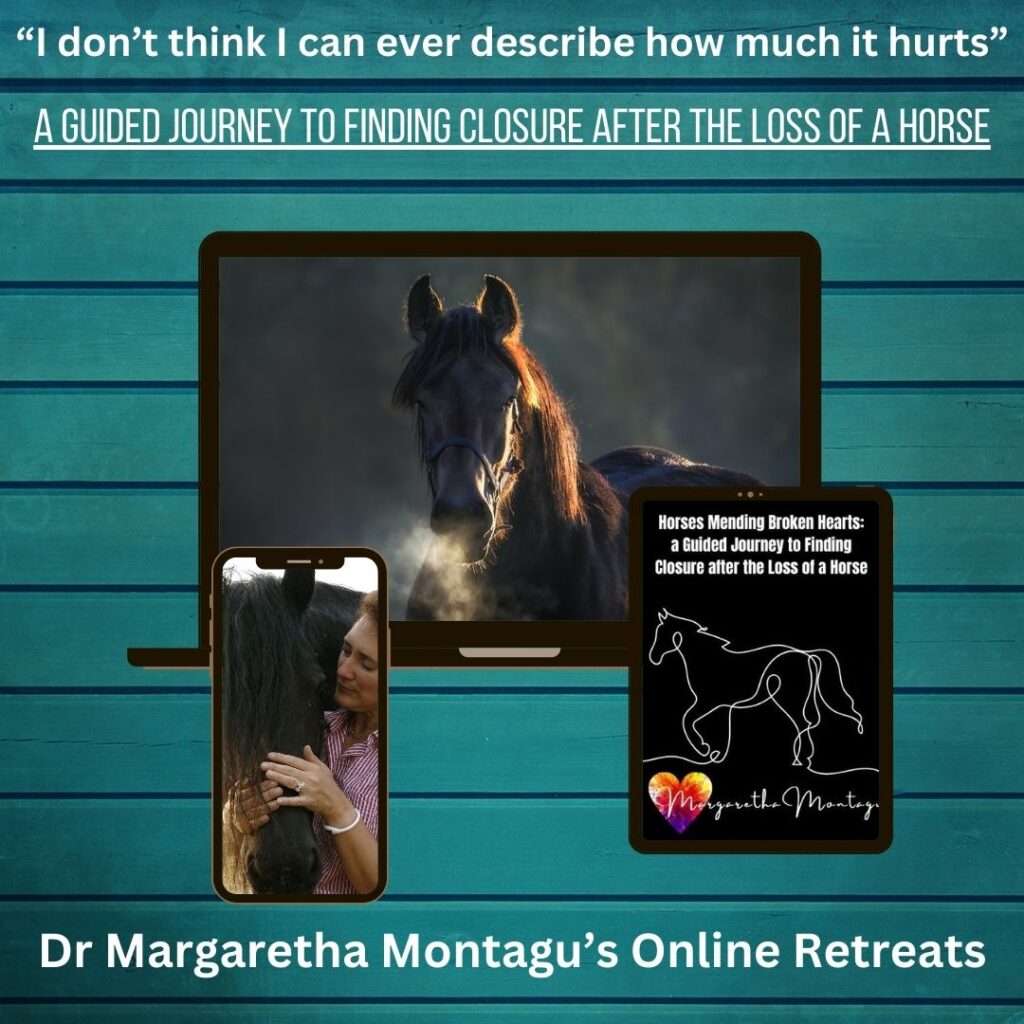Summary: Losing a loved one can be devastating. In this poignant article, we look at how horses can provide support as we navigate the depths of our loss. As always, thought-provoking journaling prompts are included – this time to encourage self-reflection and grief resolution.
“Grief is like the ocean; it comes on waves ebbing and flowing. Sometimes the water is calm, and sometimes it is overwhelming. All we can do is learn to swim.” – Vicki Harrison
Introduction:
Grief is an intense and deeply personal experience that accompanies the loss of a loved one. In times of such intense sorrow, finding the support we need can be difficult.
Horses possess a remarkable ability to facilitate the grieving process. Their gentle nature, non-judgmental presence, and intuitive understanding can help us process our loss and recover feeling supported and understood. In this article, we will explore how horses can help us navigate the challenging phases of grief.
Understanding the Role of Horses in Grief
Grief is an intense and deeply personal experience that accompanies the loss of a loved one. In times of such intense sorrow, finding the support we need can be difficult.
Horses possess a remarkable ability to facilitate the grieving process. Their gentle nature, non-judgmental presence, and intuitive understanding can help us process our loss and recover feeling supported and understood. In this article, we will explore how horses can help us navigate the challenging phases of grief.
Understanding the Role of Horses in Grief
Horses can provide a unique form of support during the grieving process. Here are some ways in which horses can help us cope with grief:
Grief is an intense and deeply personal experience that accompanies the loss of a loved one. In times of such intense sorrow, finding the support we need can be difficult.
Horses possess a remarkable ability to facilitate the grieving process. Their gentle nature, non-judgmental presence, and intuitive understanding can help us process our loss and recover feeling supported and understood. In this article, we will explore how horses can help us navigate the challenging phases of grief.
Understanding the Role of Horses in Grief
Horses can provide a unique form of support during the grieving process. Here are some ways in which horses can help us cope with grief:
- Non-judgmental Presence: Horses have a remarkable ability to be present in the moment, entirely without judging us. They are just “there” for us, and sometimes that is all that we need at that moment. When we grieve, we may experience a wide range of disturbing emotions and intrusive thoughts (Why did this have to happen to him/her?) that can be difficult to process and even more difficult to express to others. Horses offer a safe space where we can be ourselves and share our grief without fear of judgment. They accept us as we are, allowing us to freely express our feelings, without having to feel guilty that we are making things worse for our nearest and dearest.
- Reflective Listening: Horses are excellent listeners. They have a heightened sense of awareness, as prey animals, they need this to be able to survive in the wild. They can intuitively pick up on our emotional state. When we talk to a horse about our grief, even if we can barely make sense, they listen attentively and respond with calming signals, just as a mare would do with a distressed foal. This reflective listening can help us feel heard, accepted, understood and validated, providing a tremendous sense of safety and comfort.
- Physical Connection: Interacting with horses also involves physical touch, such as breathing with them, hugging them, stroking a soft muzzle or just simply standing beside them. Such physical contact releases oxytocin, a hormone associated with bonding (especially after birth) and stress reduction. This tactile connection with horses can provide a soothing and grounding experience, alleviating some of the often overwhelming emotional pain associated with grief.
- Connection with Nature: Spending time with horses often takes place in a natural environment. This setting encourages awareness of the horse, ourselves and our surroundings and being present in the moment – a moment that becomes one to cherish, instead of one to struggle through. Being in nature and engaging with horses can create a deep sense of peace and give a new perspective, allowing us to find solace and surprisingly, a renewed sense of hope despite our grief.
- Horses as Soundboards: Horses possess an incredible ability to sense human emotions. They can perceive our pain, sadness, and grief, creating a powerful emotional connection. When we engage with horses during the grieving process, they serve as soundboards, allowing us to explore and release our emotions without having to worry about hurting others.
“The reality is that you will grieve forever. You will not ‘get over’ the loss of a loved one; you will learn to live with it. You will heal, and you will rebuild yourself around the loss you have suffered. You will be whole again, but you will never be the same. Nor should you be the same, nor would you want to.” – Elisabeth Kübler-Ross
Journaling Prompt: Coping with the Loss of a Loved One
As always, I offer a couple of journaling prompts to help you start the grieving process. We use these prompts during the grief resolution retreats I host with my Friesian and Falabella horses in the south of France.
There is a lot to be gained from hugging a pint-sized Falabella horsie when you feel torn apart by grief.
Prompt: Reflect on your relationship with your loved one and explore, acknowledge and accept your emotions, memories, and experiences surrounding their loss. Use this prompt as an opportunity to express your most intimate thoughts and feelings. This will enable you to start the grieving process and come to terms with your loss.
Prompt: Write a letter to your loved one, expressing these thoughts, emotions, insights even, and the impact they had on your life. Share your sadness with him/her, but also explore how their memory continues to positively influence you, support you and shape you.
Journaling Tips:
Journaling Tips:
- Begin by addressing your loved one directly, as if they were still with you.
- Reflect on specific memories and moments you shared. Describe the feelings associated with these experiences.
- Explore the emotions you have experienced since their passing. How has grief manifested in your life? Are there any particular emotions that have been seriously challenging to navigate?
- Identify any coping strategies or support systems that might be helping you during the grieving process. Friends? Pets? Books about the grieving process?
- Discuss the ways in which your loved one’s presence still resonates in your day-to-day life. How do their memories continue to inspire you?
- Be brave, and also use this letter as an opportunity to express any unresolved emotions or questions you may have. Maybe you are angry with your loved one for abandoning you?
- Conclude the letter by expressing your love for this person (or animal!) and mention how grateful you are to have had them in your life and how their memory will continue to sustain you in the future.
This is not an easy exercise, but it can be an enormously beneficial one. If you get stuck, don’t hesitate to ask for help.
Books to Support the Grieving Process:
1. “The Healing Power of Horses: Lessons from the Lakota Indians” by Linda Kohanov
2. “Horses and the Mystical Path: The Celtic Way of Expanding the Human Soul” by Adele von Rust McCormick and Marlena Deborah McCormick
3. “Grief Works: Stories of Life, Death, and Surviving” by Julia Samuel
4. “Healing After Loss: Daily Meditations for Working Through Grief” by Martha Whitmore Hickman
5. “The Wild Edge of Sorrow: Rituals of Renewal and the Sacred Work of Grief” by Francis Weller
These books offer valuable insights, guidance, and support for navigating the grieving process, whether or not horses are directly involved. They provide tools, stories, and wisdom to help you find comfort and support. As you stumble along the path to healing, these books can provide guidance. Grief is a deeply personal process, and it is essential to find what resonates with you and your unique journey.
Losing a Heart Horse

If the loved one you lost was a horse and you are struggling to cope with overwhelming grief and long for guidance, support, and a safe space to navigate the complex emotions that accompany such a devastating loss, I created an online retreat, “Horses Mending Broken Hearts: A Guided Journey to Finding Closure after the Loss of a Horse” after I lost my once-in-a-life-time horse. Losing a heart horse is a bit different from losing a human, mostly because family and friends who are not into horses often underestimate the extent of our grief. During this online retreat, I aim to provide a roadmap to closure after your loss, along the path I travelled, and am still travelling, to come to terms with the loss of my soulmare Belle de la Babinière.
Conclusion
The companionship of horses can be an invaluable aid during the grieving process. Their intuitive understanding, non-judgmental presence, and ability to validate our emotions create a space where we can recover, at our own pace and in our own time. By embracing their gentle nature and allowing ourselves to be vulnerable in their presence, we open ourselves to the profound lessons they have to offer. They teach us to honour our emotions, find solace in the present moment, and prioritise our healing journey. Whether we engage in activities such as grooming, walking, or simply being in their presence, horses can help us cope with our loss and make us more resilient.
Spending time with my other horses and embracing the healing art of journaling as I navigated the path of grief after I lost my heart horse, made me more resilient, but also more tolerant and understanding of others’ grief.
I hope this article helps you cope with that feeling of falling into a bottomless pit and inspires you, maybe with the help of a horse or two, to crawl out of that dark place and into the light again.
Much love,

Note 1: Horses can help us deal with loss, but it is important to note that while horses can provide valuable support in the grieving process, professional guidance, such as grief counselling, should be considered for more comprehensive support. Horses can complement therapeutic interventions and serve as companions on the journey of grief resolution.
Note 2: This article is for informational purposes only and should not replace professional guidance or therapy. If you are experiencing intense grief or struggling with your emotions, consider seeking support from a qualified therapist or grief counsellor.
©MargarethaMontagu
Discover the Art of “Savoir Vivre” in the Picturesque Southwest of France!
Are you ready to embark on a captivating journey through the idyllic landscapes of the Southwest of France? Join me as I share the enchanting tales of life in this picturesque region. Each month, I pour my heart into crafting the Savoir Vivre Vignettes newsletter, a window into my world and the soul-stirring experiences that unfold here. To receive this monthly dose of inspiration, simply subscribe to Savoir Vivre Vignettes by clicking the link below. As a subscriber, you’ll be the first to receive exclusive stories, insightful articles, and early-bird/last-minute special offers on upcoming online and onsite retreats.
.


